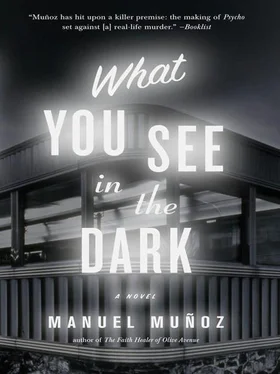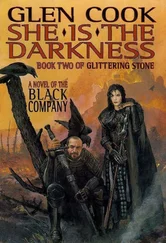So up the stairs they went, her hand fumbling along the wall for the switch but feeling, instead, Dan’s strength behind her, his hard torso underneath his shirt.
That night, your boyfriend, your husband-to-be, your clean hairline across the back of the neck, your Everly Brother, walked you to the front door, the light on, the parents sleeping assuredly inside, the porch swing still. At the Jolly Kone, his hand had moved yours to the aching bulge, urging, but marriage was coming. That was not respectable behavior anymore.
You behaved one way at the drive-in, but being a wife means something different. If there’s a promise to be a good husband, then the aching bulge can wait until the white fence appears, along with a house with the sparkling kitchen and the shiny teacups.
Up in that room above the bowling alley, she would have tidied up before she left for the theater. What little she had, she had put in its place, no matter that the room looked meager.
A single bed with light blue cotton sheets. A table and a chair. Tin cups, the blue-speckled kind. Blue curtains hanging on a rod.
The blue curtains were a fact. You saw them yourself, fluttering from the window once.
An electric radio? A rotary fan? An iron? The white blouses she wore to work. Her plain black flats. Her blue denim skirt. What else could she have had?
A yellow nightgown, lifted from the top drawer of the dresser, unfurling like a ghost. A patch of white fabric starting at the neckline and covering the breasts, a spring of flowers etched in as decoration.
Like yours.
On the porch, your boyfriend swallowed hard, full of nerve and frustration. You watched his Adam’s apple pitch up and down. “Sit with me,” he pleaded, pointing to the swing. “I’ll be quiet.”
What else? Deodorant on top of the dresser and bobby pins and a hairbrush, white cotton panties in the drawer. But toiletries are not possessions, and that girl came from nothing. So she had nothing.
If you bring down those blue curtains, nothing but the cold white light of winter pours in.
“Sit with me,” he said.
The way Ricky Nelson had sat on the kitchen table, boots perched on a chair, legs spread wide. Being able to watch him, take him in.
On the porch, you relieve him a bit, touch him. He still doesn’t know that he’s enormous and beautiful. He won’t ever really know, if he keeps the promise of his engagement ring, the metal rubbing him as he closes his eyes.
“You ever think about leaving Bakersfield?”
“Never.” That girl says it. The word slips from her because it’s true but false at the same time. But it’s you who dream of Dan Watson taking you away in his Ford pickup truck, out somewhere to a big white farmhouse with a clothesline out back and a garden and a room where you could watch TV on a set from Stewart’s. The word comes from inside, a hesitant, nervous bubble that could not have formed itself fully as a word, and it flashes instead as a smile, her hand moving up to contain it, to hide it. That girl looking down at the floor of her rented room, the rough grain of the wood.
“Closer,” he urged.
From the record shop, a collection of A sides, purchased by Dan Watson and handed to her in a brown-papered package: “All I Have to Do Is Dream” by the Everly Brothers. “I Only Have Eyes for You” by the Flamingos. “Put Your Head on My Shoulder” by Paul Anka.
An expensive record player and the needles, too.
“Closer.”
The space between is a wide, enormous distance, a destination — there’s so much urgency to get across — the pinpoint of some kind of promise way out beyond seeing. Never close enough.
She moved toward him. She moved toward it.
You extended your hand and he reached for it, strong and now clammy with sweat. She raised her hand to his lips very softly, then rested it on his cheek, cupping his face. He kept his hand over yours, moved his fingers across your cheek, your nose, your ears, urging you to touch him. You kissed him and he tasted like cold, like water from a tin cup, the blue-speckled kind.
“Who’s Sorry Now?” by Connie Francis. “Tears on My Pillow” by Little Anthony and the Imperials.
He let go of her hands and she could not feel him at all, just her eyes closed to him and his lips wet and cold. She floated, nothing tethering her but Dan Watson’s lips, his lips parting and becoming his mouth, the cold giving way to a warmer feel, the dart of his tongue searching her. This was the feeling she liked, his strong hands on her arms, holding her to him, an anticipation, like walking past a flock of birds feeding on street crumbs, waiting for them to burst into the sky at the slightest threatening motion.
“Poor Little Fool” by Ricky Nelson.
Your boyfriend’s thigh pressed against yours as you sat on the porch swing, and you wanted to open your eyes to see Dan Watson, his rugged and beautiful face, to see him the way the pretty waitress at the Jolly Kone saw him.
They kept kissing, wet and deep. The bed squeaked. Dan Watson inched closer. She could feel the entire plane of his body now — his leg, his torso, his arm — and she reached down and felt the hard length of him. She kept her hand there, not moving, before giving in to his urgency, his fingers pushing her to explore.
There were men who sat at kitchen tables and sang gentle songs with the round O of their mouths. There were men holding guns, both good and bad. There were men riding sinister horses. There were men hell-bent on terrible missions. There were men who nodded their heads politely at the women. All of them had this need. All of them.
He unbuckled his belt, the sound of the metal unlatching, his jeans undone into a deep V, his underwear pulled down to give a full view. She gripped him harder, enjoying how it forced him to close his eyes, how she’d seen him do this at the drive-in, how she’d done it before. His hands rustled up her skirt and she closed her eyes, how one day they’d do this in their white farmhouse.
You closed your eyes, how one day you’d do this in a white farmhouse.
You could never tell those ladies such a thing.
“That Mexican boy,” they said, but they could say nothing more about him.
“I can’t imagine …,” you said, but you could. That Mexican boy and his gifts in the jar, the way you could feel his hard stare in the darkness of the cantina, the same way you could almost touch the desire of the pretty waitress at the Jolly Kone.
You can imagine.
Maybe an observation, like a coin tossed into a pool of water, just to see the ripples when you tell it.
I heard, you might try, the Mexican boy showed up that night at her apartment. People could finish the story with that, jealousy enough of a fuel to explain what happened.
The people in the theater could tell you that men come to blows over women all the time, fists landing in savage anger.
What no longer matters is how Dan Watson killed her. What matters is that she’s dead. What matters is not whether that Mexican boy shouted up from the darkness of the deserted street, but the blood in the stairwell. How it got there, after all, was a fact.
Many months from now — months — people will file into the Fox Theater to watch the suspense picture, the one with a motel, that one that looks just like the one out on the west of town, and everyone will see a dark silhouette get up and walk away in a pinched, furious manner.
You will be there and will see only a dark silhouette, but you’ll believe those people when they claim it was Dan Watson’s mother. She saw what was coming up on-screen. Who — who on earth — ever wants to put themselves in someone else’s shoes? To see something so close to them?
The drive-in. The theater. The stairwell. The lawn just past the porch swing. What you do with darkness is pitch yourself into it.
Читать дальше












